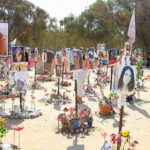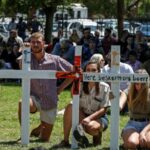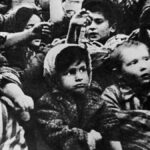Blog Post
Three children under the Swastika
First published in the Times of Israel on September 17, 2013 (Link: http://blogs.timesofisrael.com/three-children-under-the-swastika/).
I often think that it is difficult for members of Generation Y to fully grasp the reality of the Holocaust and just how recent the geographically sprawling and bloody events actually were. Living in widespread prosperity–almost unprecedented in human history–and possessing attitudes of entitlement proportionate to that, the young people of the West in my generation have, generally speaking, never had to deal with the horrific reality of Western governments slaughtering human beings based on race or religion on a mass scale, or had to experience house-to-house warfare that might very well include our own house, or watch invaders gun down neighbors in the streets of our own villages and cities. We are the generation that possesses so much material wealth we’ve coined the term “First World Problems”—perhaps not realizing that a mere 70 years ago, the problems of the “First World” looked much different. In the 1930’s and ‘40’s, the unimaginable became a horrific reality.
I’ve had several opportunities over the last several years to interview Holocaust survivors, and have always found it hard to reconcile the calm, collected demeanor of those I’m speaking with to the brutal realities they are describing, from the horrors of Auschwitz to family members who disappeared without a trace into the maw of the Nazi inferno. Then, a couple weeks ago, I spoke by phone with a lovely Vancouver woman, Mariette Rozen, who survived the Holocaust hidden in the Netherlands. While thinking about her story, I struck upon a way of contextualizing it by contrasting her experience with those of my maternal grandparents, both of similar age and both of whom grew up in the Netherlands through the grueling years of the Nazi Occupation. As their grandson, I can better connect with and understand their experiences—and then, perhaps, Mariette’s, as she lived through the war in the same tiny country, but under drastically different circumstances.
The Nazis swept into the Netherlands in May of 1940—and my gran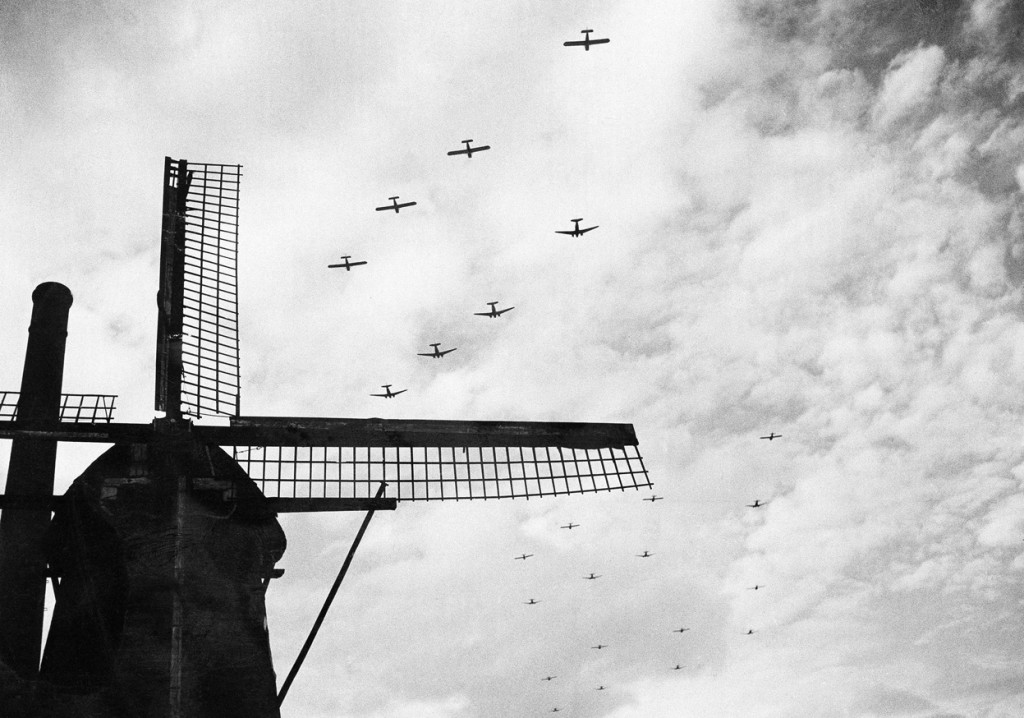 dfather Joe den Bok, who passed away last year, remembered the event clearly. The Nazi bombers began to fly over his parents’ house in the village of Veen on May 10–his seventh birthday.
dfather Joe den Bok, who passed away last year, remembered the event clearly. The Nazi bombers began to fly over his parents’ house in the village of Veen on May 10–his seventh birthday.
“I didn’t have much understanding of war yet,” he told me.
I heard that the Germans, they entered the country…those planes came very low and they went to Rotterdam and Rotterdam was bombarded very heavily. By nine o’ clock, the German troops came through the town. There were a lot of troops and horses, and so we were laying at the side of the road and just observing it because we were children and a little bit more free to stare than the older people.
The planes Joe den Bok saw, it turns out, were only the first wave—the Rotterdam Blitz, in which much of the city was leveled by the Luftwaffe, was to happen on May 14.
My grandmother Pia Dam also remembers the beginning of the German Occupation, even though she was only three (born September 17, 1936.) On May 13, the day before the Rotterdam Blitz, Pia was in the city with her mother—“just before Pentecost,” as she remembers it. They were shopping for church clothes, and Pia’s mother bought her a pair of beige leather shoes. The following morning, Pia stood outside and watched “the smoke and fire of Rotterdam rising in the sky.” The entire city centre—including the department store she had been at the day before—had been destroyed by German bombers.
Mariette Rozen’s memories of the year 1940 are much different—she, unlike my grandparents, was Jewish. She was born on May 10, 1935 in Brussels, and the Nazis marched into Belgium four years later in 1939. One of the few memories she has before she was taken into hiding was:
My mother and my sister Esther and my brother Jack and my brother Henri were walking down a road—turns out we were walking towards Paris to escape Brussels. On the road we met thousands and thousands of people who were walking from Paris to Brussels—of course, I didn’t know this ‘til years later. I know the memory because I looked up and I saw silver birds, which turned out to be planes…and those planes were diving down the road where all the people were and they were shot at. My brother pushed my mother, my sister, and my two brothers and I into the ditch. And that was my first encounter with death—people were falling and blood all over.
Her slow realization that anti-Semitism was a new and enforced policy started to surface around the same time—around 1939 to 1940, Mariette supposes. “Not just kids on the street, but kids I was playing with!” she told me.
They started to call me names, and I thought it was because my mother had sewn a yellow star on my dress. I used to tear it off my clothes because I wanted the kids to play with me. But they wouldn’t play—they started calling me a ‘dirty Jew,’ or ‘a dog.’ I couldn’t understand—I kept saying to my mother, ‘I don’t think they like the yellow star!’
Indeed, immediately after the invasion of Belgium, the Nazis instituted anti-Jewish policies, including severe restrictions of their civil rights and the outright confiscation of their properties and businesses.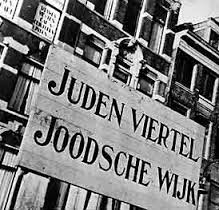
Across the border in the Netherlands, the Nazis lost no time in instituting similar measures against Dutch Jews as well. Many Netherlanders moved quickly to assist their Jewish countrymen—often at great cost. Pia remembers being sick at home one day and seeing a group of Dutch prisoners across the street at a truck station, arrested by the Germans for hiding Jews. They were wearing thin clothes and their wooden shoes, she recalled, as the Germans clearly hadn’t given them enough time to get dressed. When the Nazis spotted little Pia peering out the window, they pointed their rifles at her to scare her away. She later learned that those arrested were murdered by the Nazis.
In spite of new Nazi policies against Dutch Jews, Mariette’s family decided that sending her to the Netherlands would be safest. Her mother, unfortunately, had believed the Nazi lies that if she registered her family with the authorities, they would be safe from arrest and deportation. Her brother Jean, Mariette remembered, was furious, and her family went into hiding. Little Mariette was first hidden in an orphanage, and then, she remembers, in Holland.
“I left the orphanage, [and] my brother had taught me how to read a map. You don’t need to read, you can [just] follow the road,” she told me.
Henri had taught me all these things and I smuggled myself. I always left people without saying a good bye. That was the first thing I was taught, you never say anything. I left the orphanage and I was to meet someone on a motorcycle that was at a corner. It was a young man, and he put me in the side cart and never spoke to me the whole time he took me from Brussels to Holland. It was always at night.
I remember the house with the windmills,” she recalls, “and that is how I knew I was in Holland.”
[My brother] dropped me off outside of this little town and I had to walk and I followed the map. My brother told me…you can’t ask questions, you can’t ask anybody anything. This was always at night, anyways—very few people were out there. I walked to this farm, and the lady knew I was coming. I went to bed and the next morning I had to go to the city hall to tell the Mayor a message which I can say today was that there was eighty Jews hiding in this town and he had to tell them to leave because the Gestapo were coming. I stayed with this lady [and] acted like I was deaf and dumb to the neighbors until I learned to speak and understand. It [took] three months to learn [the] language and speak it.
Mariette was entering a country under siege—the Germans were everywhere. Joe den Bok recalled that by the end of 1943, twenty-five Germans were living in the large den Bok farmhouse and barn, taking up residence to look after the bridges in the town of Veen. “First the Dutch blew them up so that the Germans couldn’t use them,” he explained, “and in the meantime some of the bridges were rebuilt again, because the Germans did that. And as ’43 went on, we basically had Germans in our house…yeah, until the end of the war.”
In Nieuw Beyerland, the Dam family was also forced to host Germans. Pia remembers two German soldiers moving into their house. “Everything was nice and clean, the house had been whitewashed and painted,” she said, “but the very first day, the two Germans went next door, stole the neighbor’s chickens, and slaughtered them in an upstairs room.” Pia’s mother, of course, was as furious as she was helpless.
Not all Netherlanders, however, were satisfied with being helpless. Joe den Bok’s uncle, he recalled, was the head of a resistance cell in that part of the country. “They tried to sabotage the Germans,” he told me, “When [the Germans] were picking up people in town again, he would try to reach our house and hide in the haystack by us, so he did make it to the end of the war.”
However, not all resistance activities ended well. Pia recalls that the Dutch resistance in her area ambushed and killed the Nazi-appointed Dutch mayor of her city. In retaliation, the Germans “picked out the first ten Dutchmen on bikes, lined them up on the side of the road, and gunned them down. “One boy, about seventeen to nineteen years old, was one of them—he screamed ‘Murder!’ so loud you could hear it miles away.”
Mariette Rozen’s memories of the war years in Holland are also disjointed and traumatic. “Seeing people picked up,” she said in another interview, “I remember a man with no nails or toenails. I found out later on that his nails were pulled out and he was tortured. Hunger. I don’t think I want to go into any more details than that.:
The war ended in May of 1945, with the Netherlands being liberated by Canadian forces. The Netherlands was plunged into celebration and an explosion of revenge. “I’ll never forget that morning when the neighbor came and said that the war was over,” Joe den Bok recalled.
And even on that particular morning there was a German who was still trying to shoot and kill some people…and as soon as the war was over [the Dutch] got out the truck and loaded up all the NSBers (the NSB being the Dutch Nazi organization.)
“On a Friday night,” Pia Dam remembered, “a neighbor tapped on the window saying ‘We’re free! We’re free!’ Then the family knelt down and prayed.”
For the den Bok and Dam families, the end of the war meant the long process of struggling to support their families in a country shattered by the four long years of Nazi occupation. For little Mariette Rozen, the Jewish girl from Brussels, the future looked quite different. “We were all picked up and put in different age categories of orphanages and held there,” she said.
They came and said that anyone that wanted to leave the country was to go to the city hall and fill out this form. I went because I didn’t trust anybody, and acted like I was somebody else picking up papers for another child and that my mother was sick at the time.
Two years later in 1947, at the age of eleven, Marie Doduck left for Canada along with three of her siblings, reunited by the Jewish Congress. She had lost her mother and several of her siblings to the Holocaust, the horrors of which the world was only just beginning to grasp.
Fifteen years later, in 1960, Joe den Bok met Pia Dam, married her, and they too headed to Canada. They settled down and raised a family in Chilliwack, British Columbia, a mere hour away from where Mariette now lives.
Mariette now focuses on bringing her story to people like myself. While my family, too, experienced Nazi persecution, their experience pales in comparison to the horrors that she and Jews from Belgium, the Netherlands, and across Europe were subjected to. The message she brings, however, is one of hope.
“To us, we believe there is only one God,” she told me from her home in Vancouver as she prepared to celebrate Rosh Hashanah, the Jewish New Year, “and we believe that one person can save the world. One person can save the world. Change it. That is what I am saying to you.”
And perhaps, if enough people hear her, we can.


